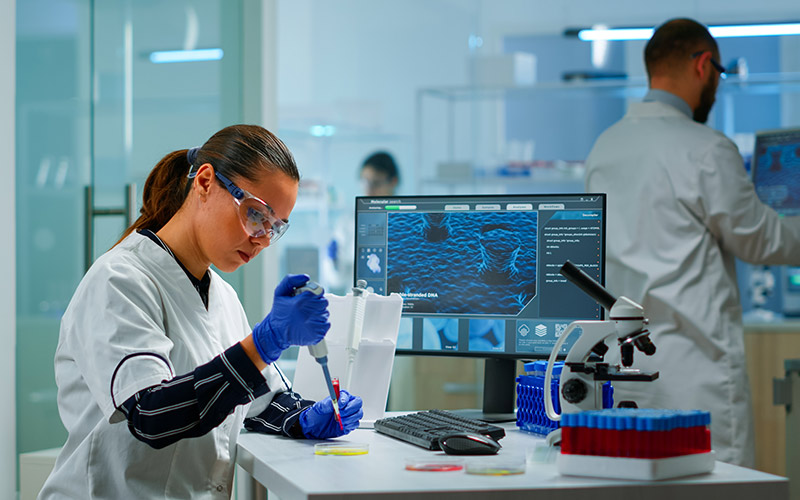
Medical laboratory technology, or MLT, is an important branch of medicine that deals with the examination of tissues, physiological fluids, and other materials to help with illness diagnosis, monitoring, and treatment. Students who complete the medical laboratory technology course will be able to accurately interpret data, handle complex equipment, and conduct laboratory tests. Graduates of this extensive program are prepared for a wide range of positions in clinical laboratories, and research institutes, greatly enhancing patient care and public health.
A Bachelor's degree in medical laboratory technology is one of the most popular lab technology programs to pursue after high school to become affiliated with pathological laboratories. The curriculum provides a strong career path and a variety of job opportunities.
A Medical Lab Technician degree can lead to career opportunities in a variety of medical specializations. After completing medical laboratory technician courses, they have a wide range of job options. Numerous chances exist for students majoring in medical lab technology to further the medical sciences' advancement and research.
A lab technologist or technician conducts mechanical, technical, and medical tests in a laboratory setting. They also record and analyze various data, as well as maintain the lab's equipment. Senior specialists, researchers, or physicians may supervise laboratory personnel while they are at work. You should become more knowledgeable about the several lab technician courses available as well as the duties and position of a lab technician if you are interested in working in this field.
The role of medical lab technologists is essential to the healthcare system. They diagnose illnesses by performing laboratory tests on patient samples, including blood, urine, and various tissues. With accurate and timely test findings, a medical lab technician can aid in the early detection and treatment of a variety of medical conditions. You will eventually be helping patients get better outcomes.
A career as a medical lab technician is in high demand. The healthcare sector is expanding, and this increases the need for medical lab technologists. The need for qualified individuals to conduct laboratory tests and support medical technologists and physicians is growing as the population ages and analytical technology develops.
After completing medical laboratory courses and earning a qualification, a career as a medical laboratory technician or technologist allows you to significantly improve patient care. Because it falls under the paramedical education category, this medical laboratory technology diploma program is career-oriented.
The best candidates for this position are those who have completed their diploma in medical laboratory technician courses. In addition to carrying out laboratory tests and procedures, they are in charge of gathering and processing multiple forms of specimens, including blood, urine, and tissue samples.
After earning a diploma in medical laboratory technology, there are lots of excellent career options. Purchasing and giving patients over-the-counter medications while under medical supervision is the responsibility of this profession. The medical laboratory technician courses may also be finished in a single year, however, students are free to pursue an associate's degree if they so wish, which may increase their competitiveness as applicants.
These experts work with pathologists to prepare and diagnose tissues, blood samples, and other comparable human fluids in a laboratory setting while maintaining sterility. It can occasionally be necessary for pathologist assistants to examine the deceased's body to determine the actual cause of death.
You can assist radiologists during prolonged and intricate radiographic studies after finishing a medical laboratory technology course. Body components must be positioned correctly beneath X-ray machines, but you must be careful to protect them from radiation. It is crucial to use the machine correctly, capture images with the right amount of detail, contrast, and density, and create reports that will be forwarded to the radiologist for review and analysis.
Analyst for Laboratory Systems
An expert in managing and optimizing laboratory information systems (LIS) is known as a laboratory system analyst. Creating, putting into practice, and managing laboratory information systems are the key duties of a laboratory system analyst.
Students who complete the medical laboratory technology course will have the knowledge and abilities necessary to work in the healthcare industry. Graduates are equipped to carry out crucial diagnostic tests, support patient care, and maintain the highest standards of accuracy and professionalism in laboratory settings through practical training and theoretical understanding.